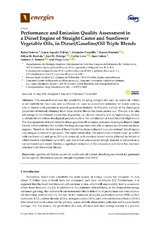Mostrar el registro sencillo del ítem
Performance and Emission Quality Assessment in a Diesel Engine of Straight Castor and Sunflower Vegetable Oils, in Diesel/Gasoline/Oil Triple Blends
| dc.contributor.author | Estévez, R. | |
| dc.contributor.author | Aguado-Deblas, Laura | |
| dc.contributor.author | Posadillo, Alejandro | |
| dc.contributor.author | Hurtado, Beatriz | |
| dc.contributor.author | Bautista, Felipa M. | |
| dc.contributor.author | Hidalgo, José M. | |
| dc.contributor.author | Luna, Carlos | |
| dc.contributor.author | Calero, Juan | |
| dc.contributor.author | Romero, Antonio A. | |
| dc.contributor.author | Luna, Diego | |
| dc.date.accessioned | 2020-06-24T20:06:00Z | |
| dc.date.available | 2020-06-24T20:06:00Z | |
| dc.date.issued | 2019 | |
| dc.identifier.uri | http://hdl.handle.net/10396/20202 | |
| dc.description.abstract | This research evaluates the possibility of using straight oils such as castor oil, which is not suitable for food use, and sunflower oil, used as a standard reference for waste cooking oils, in blends with gasoline as second-generation biofuels. To this end, a study of the rheological properties of biofuels obtained from these double blends has been carried out. The aim is to take advantage of the different properties of gasoline, i.e., its low viscosity and its high energy density to obtain blends whose rheological properties allow the substitution of fossil diesel in high extent. The incorporation of fossil diesel to these gasoline/oil mixtures produces diesel/gasoline/oil triple blends, which exhibited the suitable rheological properties to be able to operate in conventional diesel engines. Therefore, the behavior of these blends has been evaluated in a conventional diesel engine, operating as an electricity generator. The triple blends allow the substitution of fossil diesel up to 40% with sunflower oil, and up to 25% with castor oil, with excellent power results achieved for blends in which diesel is substituted up to 40%, and also in fuel consumption at high demand in comparison to conventional fossil diesel. Besides, a significant reduction in the emission of pollutants has also been obtained with these triple blends. | es_ES |
| dc.format.mimetype | application/pdf | es_ES |
| dc.language.iso | eng | es_ES |
| dc.publisher | MDPI | es_ES |
| dc.rights | https://creativecommons.org/licenses/by/4.0/ | es_ES |
| dc.source | Energies 12(11), 2181 (2019) | es_ES |
| dc.subject | Gasoline oil blends | es_ES |
| dc.subject | Castor oil | es_ES |
| dc.subject | Sunflower oil | es_ES |
| dc.subject | Biofuel | es_ES |
| dc.subject | Diesel engine | es_ES |
| dc.subject | Electricity generator | es_ES |
| dc.subject | Smoke opacity | es_ES |
| dc.subject | Bacharach opacity | es_ES |
| dc.subject | Straight vegetable oils (SVO) | es_ES |
| dc.title | Performance and Emission Quality Assessment in a Diesel Engine of Straight Castor and Sunflower Vegetable Oils, in Diesel/Gasoline/Oil Triple Blends | es_ES |
| dc.type | info:eu-repo/semantics/article | es_ES |
| dc.relation.publisherversion | http://dx.doi.org/10.3390/en12112181 | es_ES |
| dc.relation.projectID | Gobierno de España. ENE2016-81013-R | es_ES |
| dc.relation.projectID | Junta de Andalucía. FEDER P11-TEP-7723 | es_ES |
| dc.rights.accessRights | info:eu-repo/semantics/openAccess | es_ES |

